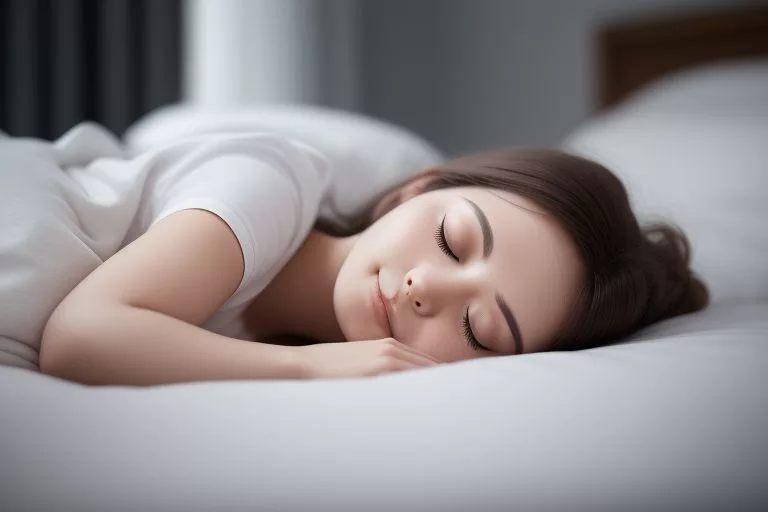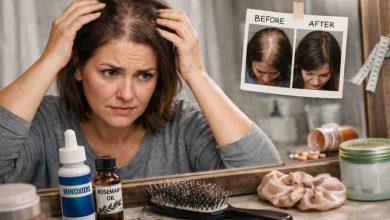

7 Steps to How to Get More Deep Sleep with Ease
Benefits of Deep Sleep
Deep sleep has numerous amazing and beneficial effects on your mental and physical health. It helps your body recharge itself so that you are prepared for the next day. It also boosts your Mindfulness and reduces mental fatigue. With deep sleep, you will wake feeling energized and ready to tackle the challenges of the day and be productive. Your immune system also receives a boost of energy, helping you to fight off any illnesses or infections. Finally, deep sleep helps reduce stress levels, alleviating anxiety and tension in the body and mind.
Strategies to Help You Get More Deep Sleep
Getting better quality sleep helps us feel less tired and be more productive during the day. There are some simple strategies we can use to get the deep sleep we need. Adjusting our sleep schedule can help us wind down before going to bed. Setting and following a bedtime routine can tell our body it is time to relax and can help us fall asleep easier. Additionally, sleeping on the right pillow and mattress helps provide the support and comfort our bodies need.
Eliminating distractions from our bedrooms can lead to a more restful sleep. Switching off our phones, closing the curtains, and not watching TV in bed can all help us drift off to sleep quickly and stay asleep longer. Avoiding caffeine late in the day and exercising regularly also increases the likelihood of a more restful sleep. Limiting the length of naps taken during the day helps ensure we’re tired enough at night so that falling asleep is easier and we can get the deep sleep our bodies need.

Adjust Your Sleep Schedule
Finding the ideal time to sleep can greatly impact your overall quality of rest. Research has found that developing a regular sleep routine helps to improve sleep health. You should try to go to bed and wake up at the same time each day, even on the weekends. This can help to improve your body’s internal clock, reducing the time it takes to fall asleep and helping you feel refreshed come morning. The ideal bedtime is different for everyone, but generally, you should shoot for a time that allows roughly 8 hours of rest each night. Additionally, you should try to limit the time spent in bed to just sleeping to avoid unhealthy habits like binge-watching and scrolling through your phone. Make sure you keep track of how much time you are awake and asleep each day to determine an ideal schedule for yourself.
Create a Sleep Routine
Getting a good night’s sleep requires you to structure your day in a certain way in order to prepare your mind and body for sleep. Creating a sleep routine can help you to establish good sleeping habits that lead to better rest. Starting your bedtime routine about the same time every night can help you feel sleepy earlier in the evening.
Your sleep routine should involve activities that you find calming. This will signal to your brain that it is time to go to sleep. This could include activities like reading a book, having a relaxing bath, or journaling before you go to sleep. Taking the time to relax and make yourself comfortable before bed can be an important part of getting the restful sleep you need.

Use the Right Pillow and Mattress
Finding the right pillow is essential to getting a good night’s sleep. A quality pillow will provide the necessary support and cushion for your head and neck, allowing for a comfortable and restful sleep. When shopping for a new pillow, look for one that is made with supportive materials that will hold its shape and not press against your skin. An adjustable pillow is also helpful, as it will give you the opportunity to customize the loft to suit your needs.
When selecting a mattress, look for one that is firm enough to support your body and properly align your spine, but still comfortable. Some mattresses also have temperature-regulating technology that will keep you cool and comfortable all night long. It’s also important to make sure that the mattress fits the size of your bed, so try out different sizes to see what works best. Investing in a quality mattress and pillow can make all the difference when it comes to a restful sleep.
Eliminate Distractions From Your Bedroom
Achieving the best quality of deep sleep can often be a challenge in today’s world where gadgets and electronic devices are at our fingertips at all hours of the day. Distractions such as laptops, televisions, alarm clocks, or mobile phones can easily get in the way of a good night’s rest. If you’re having a hard time getting the proper amount of deep sleep, eliminate distractions from your bedroom. This includes all devices that might be disrupting your sleep. Don’t keep your laptop, cellular phone, or television in the bedroom and keep your alarm clock out of sight. This task may be easier said than done, but it will be well worth it when you notice the difference in the quality of your sleep and overall well-being.
Organizing your bedroom to be as stress-free as possible can also help. Rearrange your furniture in the bedroom to create a sense of peace and relaxation. Get rid of any clutter or items that are taking up space that don’t need to be there. This will help reduce the amount of visual distractions in your space. Making your bedroom a place of relaxation will help your body prepare for the transition into deep sleep by calming your mind before going to bed.
Limit your Caffeine Intake
Caffeine can stay in your system for up to 14 hours, making it hard to sleep if you consume it later in the day. As such, it’s important to set yourself a cut-off time in the evening and to focus on limiting your overall caffeine intake throughout the day. Many people don’t realize that caffeine is found in numerous different foods and beverages, such as coffee, tea, soda, energy drinks, chocolate, and pain relievers. Therefore, switching to herbal tea, chocolate-free snacks, and decaffeinated coffee can be a big help for those who are trying to sleep better.
Besides directly cutting out late night caffeine consumption, limiting your overall daily intake can also increase your chances of getting deep, restful sleep. If you trust yourself not to overdo it, you can carefully ration how much caffeine you consume over the course of the day. This way, you can mitigate the need to cut it off completely. However, it is important to note that some people are more sensitive to caffeine than others, and should follow their own limits. Everyone’s body reacts differently, and finding the perfect balance of caffeine and sleep is an individual endeavor.
Exercise Regularly
Exercising regularly can not only help relax after a long day of work, but it will also help you get a deeper sleep at night. Regular physical activity can help improve sleep duration and quality while reducing fatigue and daytime sleepiness. Training your body to know when it’s time to rest and when it’s time to stay oxygenated will greatly improve your quality of sleep.
It is important to customize your exercise routine to your own needs. If you feel drained, consider things like light aerobics, yoga or stretching. If you need more energy during the day, try cardio or strength exercises to help stimulate your body. Exercise can be enjoyed at any time of day, allowing you to build a habit around it. Before long, your body will know when to recharge and when to get active.
Avoid Long Naps During the Day
Napping during the day can occur naturally, due to the body’s natural control of sleep cycles, but taking long naps during the day can have an effect on your nightly rest. While science is still trying to understand how exactly napping affects restorative sleep, current research suggests that long naps during the day, particularly those lasting over an hour, can have a negative impact on nighttime sleep. Napping can interfere with your sleep cycle, causing it to become less regulated and diminishing the quality of your sleep.
Creating a healthy nighttime sleep schedule is an essential part of getting good rest. If you’re feeling uniformly fatigued throughout the day, try adjusting aspects that affect your routine such as your caffeine intake, how much exercise you do, or the amount of time you spend viewing screens before bed. Incorporating creative strategies to improve your sleep quality can help you reach a deeper level of restorative sleep in the evening so that you feel energized and alert during the day.
Find Natural Sleep Aids
One of the best ways to get more deep sleep is to look for natural sleep aids. Herbal remedies and essential oils have been used for centuries to help people get a better night’s sleep. Lavender oil and chamomile tea are popular options that have been used to reduce anxiety and improve sleep. Plant-based supplements such as valerian root and melatonin are commonly used natural supplements to help induce sleep. Taking the right supplement could make a huge difference in how quickly you fall asleep and how long you stay asleep.
In addition to herbal remedies, dietary changes might also be necessary to get more deep sleep. There are certain foods such as almonds, sunflower seeds, mushrooms, avocados, and bananas that have compounds in them that reduce stress and promote better sleep. Increase your intake of these foods in your diet over time and you should notice an improvement in the quality of your sleep. Taking natural sleep aids, combined with a regular sleep routine will help you get the restful, deep sleep your body needs.
What are the benefits of deep sleep?
Regular deep sleep is essential for physical health as it helps restore energy levels, repair and heal the body, and improve mood and mental clarity. Additionally, deep sleep helps to regulate hormones, boost the immune system, and protect against chronic health problems such as heart disease, diabetes, and obesity.
What strategies can I use to get more deep sleep?
To get more deep sleep, try adjusting your sleep schedule, creating a sleep routine, using the right pillow and mattress, eliminating distractions from your bedroom, limiting your caffeine intake, exercising regularly, and avoiding long naps during the day.
What should I consider when adjusting my sleep schedule?
When adjusting your sleep schedule, aim to stick to the same sleep and wake times each day, create a pre-bedtime routine, limit your exposure to blue light from screens in the evening, and make sure your bedroom is dark and cool.
How do I create a sleep routine?
Creating a sleep routine is an important part of getting quality deep sleep. Your sleep routine should include things like winding down before bed, setting a regular bedtime, avoiding stimulants and habits that keep you up, and avoiding screens for at least two hours before bed.
What should I look for in a pillow and mattress?
When selecting a pillow and mattress, look for items with good support that keep your spine in alignment while you sleep. The ideal mattress is usually medium to firm, depending on your sleeping position, and the ideal pillow is one that supports your neck and head while in your preferred sleep position.
What are some ways to eliminate distractions from my bedroom?
To eliminate distractions from your bedroom, try removing electronics like TVs and computers, limit the amount of clutter in the bedroom, turn off any lights that could disrupt your sleep, and block out any sound or light coming from outside.
How can I limit my caffeine intake?
To limit your caffeine intake, try avoiding caffeinated beverages after noon, avoiding caffeine for at least six hours before bedtime, switching to decaffeinated coffee or tea, and drinking plenty of water throughout the day.
How often should I exercise to improve my sleep?
Regular exercise can help improve your sleep, but it is important to not do intense exercise too close to bedtime as this can make it more difficult to fall asleep. Aim to exercise at least four to five times a week at least four hours before bedtime.
What are the risks of taking long naps during the day?
Taking long naps during the day can disrupt your sleep-wake cycle and make it more difficult to fall asleep at night. If you do need a short nap, try to keep it to 30 minutes or less.
What natural sleep aids can I use to help me sleep?
There are a variety of natural sleep aids that can help you get better sleep. These include aromatherapy, magnesium supplements, valerian root, chamomile tea, lavender essential oil, and melatonin, which is a natural hormone produced by the body that helps regulate sleep.



